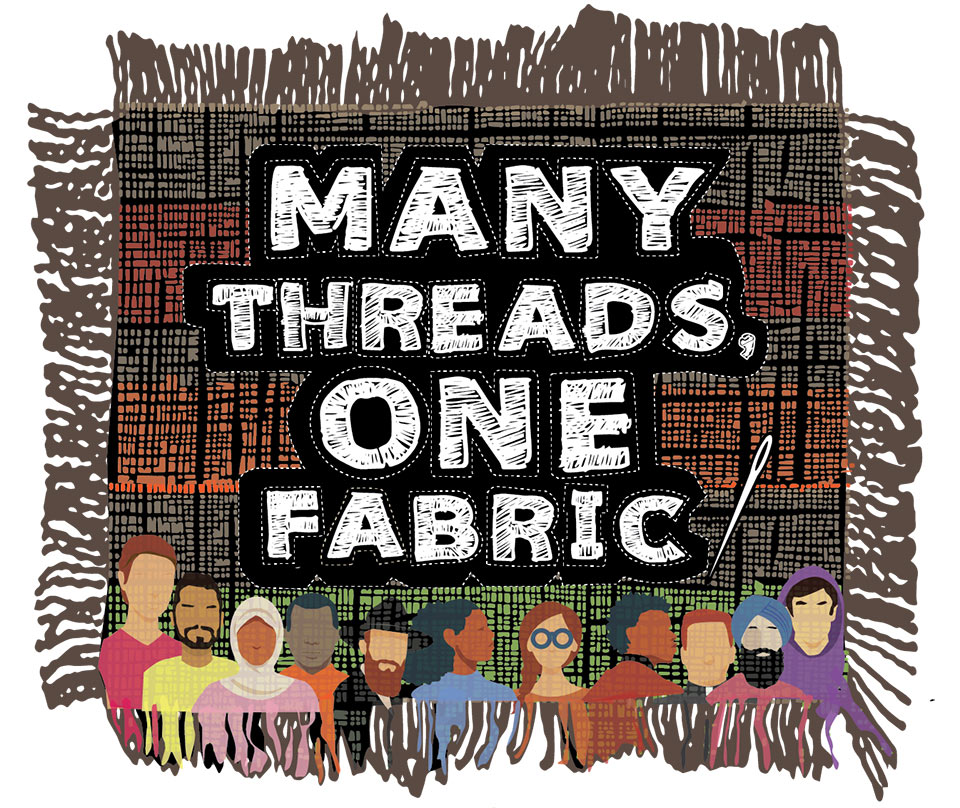His latest book is on the best-seller list, and in high demand. He is speaking all over the country. He just started a new job directing the Center for Antiracist Research at Boston University. Yet, in a webinar Thursday with hundreds of union activists, professor and author Ibram X. Kendi promised to help with the creation of a lesson plan about his book “How to be an Anti-Racist” for AFT’s free Share My Lesson site for educators.
A calm and focused Kendi spent an hour answering questions from union leaders and members on a NYSUT-sponsored virtual event to unearth some of the root causes of racism and support active anti-racism.
Thursday’s inaugural event kicked off “Many Threads, One Fabric,” a series of NYSUT programs that will provide professional development, leadership programs, virtual town halls, and training to challenge institutional racism. As Kendi explains, it’s not about individuals or groups of people – it’s about the power and policies that set racism into a mindset and into action.
The solution, he said, is not about “fixing” people but rather structures and foundations.
NYSUT President Andy Pallotta, who co-hosted the event with AFT President Randi Weingarten, said removing attitudinal and structural racial barriers — further exposed by the COVID-19 pandemic — would be part of the union’s ongoing activism.
Kendi’s introduction to NYSUT came when he was a member of United University Professions, the higher education union representing SUNY faculty and professional staff. He worked as an assistant professor at SUNY Oneonta from 2008-2012, and then as an assistant professor of Africana Studies at University at Albany from 2012-2015. Here he met Philippe Abraham, former UAlbany professional staff who now serves as NYSUT secretary-treasurer and is leading the union’s “Many Threads, One Fabric” initiative.
The high demand for Kendi’s books and talks “reveals volumes about the demand for fresh ideas,” said Abraham.
Kendi said fighting racism benefits people of all cultures. As an example, he said fighting against police violence against Black and brown people would also help reduce police violence against other people. Working toward a social safety net for people of color – such as paid family leave and access to health care – will help provide a social safety net for all.
To illustrate, he said a factory worker in the past earned $5 an hour, while people of color earned $3 an hour. But all of them should have been earning $15 an hour. “Those who owned the factory were dividing the workers, dividing their power,” he said.
Similarly, Weingarten noted the “Right to Work” laws started in the south after Black and brown workers started organizing. The laws, misleadingly named, were set to divide workers and divide unionism.
Kendi said teachers have an important role in anti-racism.
“If you view the child as precious, you have to view the teacher as precious,” he said. “It took a pandemic for people to realize how important teachers are.”
Calling on his roots as an educator, Kendi said introducing young people to the concept of systematic racism begins with defining racism and racist policies – using pedagogy.
“Then a person can assess their own ideas,” he said. “We want to give them tools to examine their world.”
He said he wrote the board book “Antiracist Baby” for children after being inspired to teach his then-two-year-old daughter how to be anti-racist.
“It’s a way to begin to initiate conversations…of starting as early as possible.”
In his book “How to be an Anti-Racist,” Kendi explains that “denial is the heartbeat of racism, beating across ideologies, races and nations.”
It is not enough to be non-racist, Kendi maintains; being anti-racist is what makes change happen.
“To be raised in the U.S. is to be raised racist,” he said to nearly 300 viewers on YouTube and Facebook. “Once we come to grips with it, we don’t have to stay here.”
The question is whether Americans are going to support big change.
“Cynicism is the kryptonite of change,” he said. “We always have to believe change is around the corner.”
Weingarten applauded Kendi’s work, describing how “slavery is one of America’s original sins,” followed by lynching, Jim Crow laws, and mass incarceration, among other transgressions.
It took the Voting Rights Act, which recently deceased U.S. Rep. John Lewis almost died for, to enable African-American men to vote, Weingarten explained. But since then, gerrymandering, voter suppression and the dismantling of that Act have set up new obstacles.
Weingarten called for racism to become “a relic of the past. This needs to be our fight. All of us…. It can’t be a fight just for African-Americans.” She explained that <a href="https://www.aft.org/resolution/confronting-racism-and-support-black-lives to confront racism">AFT recently approved a series of resolutions</a>.
“Elections and activism matter,” said Weingarten, noting this year is the centennial of the 19th Amendment granting women the right to vote. “Elections are our voice, elections are our muscle.”
Kendi also wrote “Stamped from the Beginning: The Definitive History of Racist Ideas in America,” which won the National Book Award for Nonfiction; and co-authored the young adult book “Stamped: Racism, Antiracism and You” with Jason Reynolds. He has had numerous essays published and received many research fellowships, grants and visiting appointments.
